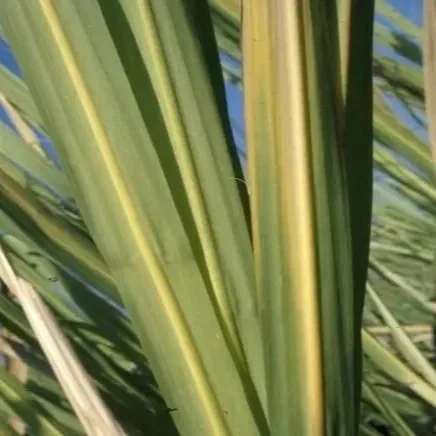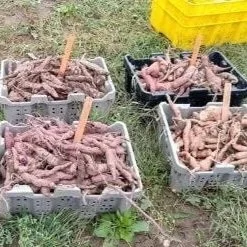Perennial Grasses Plague Southern Rice
After several seasons of perennial grasses popping up in fields and evading herbicide efficacy, Louisiana farmers and researchers are becoming concerned about future control of weeds in rice.
At the H. Rouse Caffey Rice Research Station in Crowley, Connor Webster, weed specialist for rice at Louisiana State University, said many trials have been conducted on perennial grass and sedge species with little to no response to commonly used herbicides, which is a red flag for resistance.
Read More
Easy-to-grow Okra is a Louisiana Tradition
Okra holds a special place in the hearts of many Louisianans. For some, it’s an essential ingredient in gumbo, and for others, it’s a must-grow crop in the summer vegetable garden.
It’s no wonder why: Okra is tasty and nutritious. It’s easy to grow and prolific, even in intense heat.
Read More
Cow Country Reporter: August 2025
Thank you to our CPL members who have renewed their membership in July. For those who have not, please do so by the end of August. Let me know if you need a form. Again, THANK YOU!
The month of July saw new record prices for slaughter steers and heifers coming out of the feedlots and slaughter cow prices.
Read More
'Farm Bill 2.0' Next On House Ag Committee Agenda
With the majority of farm bill provisions included in the “One Big Beautiful Bill” passed by Congress and signed into law by President Donald Trump on July 4, all that remains now is “Farm Bill 2.0,” which House Agriculture Committee Chairman Glenn “G.T” Thompson calls “not too controversial” and should pass with bipartisan support.
Read More
Rice Represented At The Inaugural Great American Farmers Market
Last week, U.S. Secretary of Agriculture Brooke Rollins launched the inaugural Great American Farmers Market here on the National Mall, just in front of U.S. Department of Agriculture (USDA) headquarters.
The market ran for several hours daily, from Sunday, August 3, through Friday, August 9, and each day was themed and featured special events in addition to the daily vendors from throughout the U.S. selling agricultural products. Themes included America Grows, MAHA Monday, Faith & Fellowship, Forests & Firefighters, America the Beautiful, and Farmer First Friday.
Read More
Louisiana Crops Newsletter: August 2025
As we move into August we expect to see looper numbers increase in soybeans. These insects do not feed on pods, but cause injury by defoliating the plants, so relatively high numbers of loopers can be tolerated compared with pod-feeding insects. Treatment is recommended between R1 to R6 when defoliation reaches 20% or when looper numbers reach 19 per 25 sweeps. It is often suggested to ignore smaller worms (<1/2 inch) in counts because many will be culled by predators and entomopathogens.
Read More
Yellow Leaf Disease In Sugarcane
Yellow leaf disease was first reported in the Louisiana sugar industry in the late 1990s. It is caused by the sugarcane yellow leaf virus, which is transmitted by the sugarcane aphid (Melanaphis sacchari). Since then, the incidence of yellow leaf disease has remained low, primarily because of Louisiana’s healthy seedcane program.
Read More
Louisiana 811 Day Reminder: Safety First, Call Before You Dig
As Louisiana approaches 811 Day on Aug. 11, it’s a timely reminder to always call 811 before you dig.
Read More
Louisiana Shrimpers Hope Trump Tariffs on India Can Help Their Struggling Industry
Louisiana shrimpers say there’s a long list of reasons why the state’s shrimping industry has been drying up in recent decades. Atop that list is the mountain of shrimp being imported from outside the United States. It’s why Pelas and other local shrimpers are applauding President Trump’s 25 percent tariff on goods from India, including its cheaper, farm-raised shrimp, which Pelas says kills competition by dragging down overall shrimp prices.
Read More
From Rice Fields to Whiskey Shelves, Fruge Brothers Build Grassroots Legacy
After decades of farming, the Fruge family transforms Louisiana rice into nationally awarded spirits, with their eyes set on becoming a household name.
Read More
LSU AgCenter Opens Registration for Fall Grazing School
The LSU AgCenter will offer a Grazing School focused on forage production this fall in Jeanerette.
The school will take place over five sessions, providing information and hands-on experience related to a variety of topics associated with growing forages for livestock operations.
Read More
The Peggy Martin Rose: 20 Years After Hurricane Katrina
A quick glance at Peggy Martin’s Gonzales, Louisiana, home, and it’s clear she loves plants. Paintings and prints of flowers line her walls, tablecloths pop with colorful flora, potted plants fill corners and bouquets dot shelves and end tables. Her yard is an oasis of greens, pinks, reds and purples.
Growing along her garden gate is an extraordinary plant with a storied past, a prolific blooming vining rose that bears her name, the Peggy Martin rose.
Read More
Port of South Louisiana Director Paul Matthews Resigns
Paul Matthews has stepped down as executive director of the Port of South Louisiana, ending a nearly three-year tenure marked by major growth and strategic development. The resignation, announced August 6, is effective immediately.
Founded in 1960, the Port of South Louisiana is the largest port in the state and the second largest by tonnage in the Western Hemisphere. It is the top grain exporter in the United States and ranks second in energy transfer volume, serving as a key logistics hub for agriculture, oil, petrochemicals, and increasingly, clean energy.
Read More
Could Sweet Potatoes Be a New Crop for New York?
Sweet potatoes are a superfood rich with vitamins, minerals and fiber.
They’re also a great source for high-value phytochemicals, such as carotenoids and anthocyanins. These chemicals impart various combinations of white, orange and purple to the crop’s flesh and skin, contributing to their popularity.
Sweet potatoes are primarily grown in southern states — North Carolina, Louisiana, Mississippi — that offer ideal growing conditions, infrastructure and established markets.
Read More
10 Tips to Stay H-2A Audit-ready
Immigration changes and labor reforms have created a moving target for farms utilizing H-2A temporary farm labor in 2025, especially for those located in isolated areas or growing specialty crops.
To maintain legal labor and stay steps ahead of evolving policies, labor consultant Katie Ramagos Nunez shared the practices she and her clients follow on the farm to simplify paperwork and stay audit-ready.
Read More















